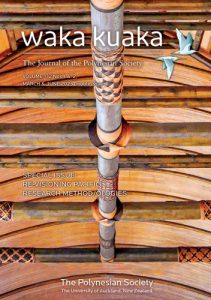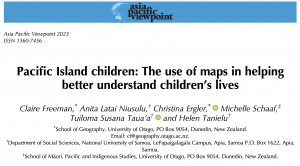Re-visioning Pacific research method/ologies in the new issue of Waka Kuaka (Journal of the Polynesian Society)

The beautiful lalava (lashings) created by Sopolemelama Filipe Tohi in the Fale Pasifika at the University of Auckland. (Picture by Julia Mageau Gray.) Click image to enlarge.
The Journal of the Polynesian Society has renewed its branding with the addition of its new name, Waka Kuaka. In the second issue, and first special issue under its new title, co-editors Dr Marcia Leenen-Young and Dr Lisa Uperesa of the University of Auckland gathered doctoral candidates and early career Pacific scholars from across Aotearoa, Te Waipounamu and Australia under the theme Re-Visioning Pacific Research Method/ologies. Three of our Te Tumu whānau were involved in the project. Dr Emma Powell and PhD candidate, Wanda Ieremia-Allan were both authors in the issue with their respective articles, “Tei te Akau Roa: An Ocean of Metaphor in Pacific Research Methodologies” and “Feiloa‘iga ma Talanoaga ma ‘āiga: Talanoa with Family in the Archives”. Professor Michael Reilly, a long-time member and supporter of the journal and society, also generously gave his feedback on Leenen-Young and Uperesa’s introduction.
In the words of the co-editors, the issue marks an “…historic shift in research practice and approaches for and by Pacific peoples and is intended to contribute new knowledge about how Pacific research methodologies and methods are being used (alone and in conjunction with other research approaches and methods). The contributions in [the] special issue help to illuminate the mutually constitutive relationship between theory and practice by sharing critical reflections and practical adaptations by early-career researchers who are raising considerations appropriate for the contemporary moment. In building on current knowledge, some deepen our understanding while others elaborate new approaches” (12).
The issue provided an opportunity for early career Pacific scholars to publish in an iconic journal of anthropology and related scholarly fields dedicated to Polynesia and the wider Pacific region. As a part of the issue’s production, the editors facilitated an innovative development and peer review process that was fully funded. The development of the special issue involved an online writing retreat, weekly 2.5 hour online writing sessions prior to draft submission, and a 1.5-day compulsory, in-person closed symposium for a double peer-review process. This was held at the Fale Pasifika in Auckland as was the launch of the issue which was held on 12 June 2023.
Collaborative Pacific research across schools and universities
It is great to see collaborative Pacific research by scholars across Otago’s schools and universities.The latest is a journal article in Asia Pacific Viewpoint featuring Te Tumu’s Dr Michelle Schaff, along with academic staff from the School of Geography and National University of Samoa on the use of maps in helping better understand Pacific children’s lives. Click here to view this open access article.
Abstract
Children’s voices have been little heard in the Pacific research. The United Nations Convention on the Rights of the Child 1989 asserts the child’s right to have a say on matters that affect them and for their views to be considered. There has been massive growth in technologically assisted participative research; however, we argue the value of hand drawn maps should not be underestimated in the rush to engage with more advanced techniques. We present data from 267 neighbourhood maps drawn by children in Fiji, Kiribati, Samoa and New Zealand. To better understand the social construction of knowledge in children’s everyday lives, we propose two models to conceptualise the complexity of their world, a social connection and a spatial connection model. These models reveal how Pacific Island children negotiate different levels of social connection from home, family, and community through to transnational kinship relations. People, specifically family, provide the geographic basis on which their spatial encounters are overlaid. Irrespective of country or rural/urban/atoll setting, it is social space that is the strongest connector for children as displayed in their maps. Application of our models can be used to reveal how knowledge is socially constructed in Pacific children’s everyday lives.


